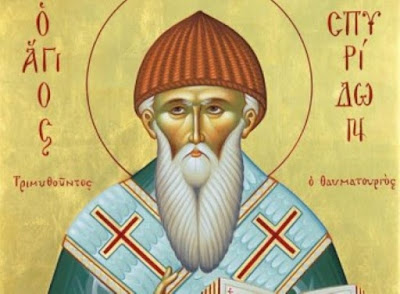Feast Day of Agios Spyridon the Wonderworker
Agios Spyridonas of Tremithus was born towards the end of the 3rd century on the island of Cyprus. He was a shepherd and had a wife and children. He used all his substance for the needs of his neighbors and the homeless, for which the Lord rewarded him with a gift of wonderworking. He healed those who were incurably sick and cast out demons.
After the death of his wife, during the reign of Constantine the Great (306-337), he was made Bishop of Tremithus, Cyprus. As a bishop, the saint did not alter his manner of life, but combined pastoral service with deeds of charity.
Because of his exceptional piety, he was chosen as bishop of the city of Trymithous. Yet even as a bishop, he did not change his simple way of living, handling his livestock and cultivating his land himself. He used very little of the fruits of his labor for himself; instead, he distributed a greater share to the needy.
He manifested great miracles by God’s power: he brought down rain in time of drought, stopped the flow of a river, raised several people from the dead, healed Emperor Constantius of a grave illness, saw and heard angels of God, foresaw future events, discerned the secrets of men’s hearts, converted many to the true Faith, and did much else. He took part in the First Ecumenical Council in Nicaea (325), and he brought many heretics back to Orthodoxy by his simple and clear expositions of the Faith as well as by his mighty miracles. He was so simply dressed that once, when he wanted to enter the imperial court at the invitation of the emperor, a soldier, thinking that he was a beggar, struck him on the face.
Meek and guileless, Spyridon turned the other cheek to him. He glorified God through many miracles and was of benefit, not only to many individuals but also to the whole Church of God. Saint Spyridon died on December 12, 348 in Trymithous,
His miracle-working relics rest on the island of Corfu, and even today they glorify God with many miracles.
Ἀπολυτίκιον
Ἦχος α’. Τοῦ λίθου σφραγισθέντος.
Τῆς Συνόδου τῆς πρώτης ἀνεδείχθης ὑπέρμαχος, καὶ θαυματουργὸς θεοφόρε, Σπυρίδων Πατὴρ ἡμῶν· διὸ νεκρᾷ σὺ ἐν τάφῳ προσφωνεῖς, καὶ ὄφιν εἰς χρυσοῦν μετέβαλες· καὶ ἐν τῷ μέλπειν τὰς ἁγίας σου εὐχάς, Ἀγγέλους ἔσχες συλλειτουργούντάς σοι Ἱερώτατε. Δόξα τῷ σὲ δοξάσαντι Χριστῷ· δόξα τῷ σὲ στεφανώσαντι· δόξα τῷ ἐνεργούντι διὰ σοῦ, πᾶσιν ἰάματα.
Κοντάκιον
Ἦχος β’. Τὰ ἄνω ζητῶν.
Τῷ πόθῳ Χριστοῦ τρωθεὶς, Ἱερώτατε, τὸν νοῦν πτερωθείς, τῇ αἴγλῃ τοῦ Πνεύματος, πρακτικὴ θεωρία, τὴν πρᾶξιν εὗρες θεόπνευστε, θυσιαστήριον θεῖον γενόμενος, αἰτούμενος πᾶσι θείαν ἕλλαμψιν.
Μεγαλυνάριον
Χαίροις των θαυμάτων ο ποταμός· Χαίροις ασθενούντων, και πασχόντων ο ιατρός· Χαίροις των λογίων του Πνεύματος ο σπόρος, Σπυρίδων Τριμυθούντος, ποιμήν τρισόλβιε.
Έτερον Μεγαλυνάριον
Χαίροις Τριμυθούντος η καλλονή, Χαίροις ασθενούντων, και πασχόντων ο ιατρός, Χαίροις των Πατέρων, ωράϊσμα και κλέος, Τρισόλβιε Σπυρίδων, σε μεγαλύνομεν.
Ὁ Οἶκος
Τὸν ἐκ κοιλίας ἡγιασμένον Ἱεράρχην Κυρίου, ἀνευφημήσωμεν νῦν Σπυρίδωνα, τὸν τῆς χάριτος πλάκας δεξάμενον θείας δόξης, καὶ ἐν θαύμασι περιβόητον πᾶσι, καὶ ὡς θερμὸν καὶ αὐτόπτην τῆς θείας ἐλλάμψεως, ὡς τῶν πενήτων προστάτην, καὶ τῶν ἁμαρτανόντων ψυχαγωγόν· οὗτος γὰρ θύων τῷ βήματι τοῦ Χριστοῦ, Ἱεράρχης πιστός ἀναδέδεικται, αἰτούμενος πᾶσι θείαν ἔλλαμψιν.
Κάθισμα
Ἦχος πλ. δ’. Τὴν Σοφίαν καὶ Λόγον.
Ἐκ ποιμνίων προβάτων τὴν τοῦ Χριστοῦ, Ἐκκλησίαν ποιμαίνειν προχειρισθείς, ποιμὴν θεοπρόβλητος, σὺ Σπυρίδων ἀνέλαμψας, κακοδοξίας λύκους, ἐλάσας τοῖς λόγοις σου, ἐν εὐσεβείας πόᾳ, αὐτὴν ἐκτρεφόμενος· ὅθεν ἀναμέσον, θεοφόρων Πατέρων, τὴν πίστιν ἐτράνωσας, τῇ σοφίᾳ τοῦ Πνεύματος, Ἱεράρχα μακάριε· Πρέσβευε Χριστῷ τῷ Θεῷ, τῶν πταισμάτων ἄφεσιν δωρήσασθαι, τοῖς ἑορτάζουσι πόθῳ, τὴν ἁγίαν μνήμην σου.



Σχόλια